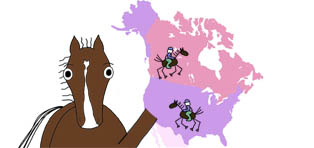By Micaela Myers
 Traci Falcone, Heather Reynolds, and Hal Hall offer their tips on handling common hore behavioral problems
Traci Falcone, Heather Reynolds, and Hal Hall offer their tips on handling common hore behavioral problemsRecreational riding is America’s No.1 equestrian pastime. Nothing compares to exploring nature on horseback. But when you visualize yourself on the trail, a barn-sour, jigging, bolting, spooking horse probably isn’t part of the fantasy. These all-too-common bad habits have ruined many a trail ride: Don’t let yours be one of them. Find out why your horse may be acting up and how you can deal with these annoying and sometimes dangerous behaviors.
Why Do They Do That?
Horses don’t act up just to be naughty or to hurt us. Instead, there’s usually a valid reason behind a horse’s bad behavior: He may have too much pent up energy and need extra turnout or riding time; his tack may be pinching or hurting him because it doesn’t fit correctly or isn’t properly adjusted; he may be in poor health or receiving the wrong kind of diet, which your vet can help you remedy; he may need additional training so that he understands what you’re asking. Similarly, you may require additional instruction to improve your cues, and you may need to relax and act calmly in stressful situations to avoid escalating your horse’s behavior. Addressing these issues should be part of your overall strategy.
To help you tackle some of the most common problem trail behaviors—barn sour, jigging, bolting and spooking—three experienced endurance riders share how they handle these issues. An avid Parelli Natural Horsemanship student, Traci Falcone has completed more than 4,000 miles on endurance rides, including four Tevis Cup “100 Miles in One Day” rides; Heather Reynolds has won several Pan American Endurance Championship medals; and Hal Hall was inducted into the American Endurance Ride Conference Hall of Fame with many championship wins.
Because horses are individuals and no one approach will work on all horses, Falcone, Reynolds and Hall offer a variety of tactics for each of the four issues below. Find the approach that works best for your horse, and be consistent and patient as you work to overcome his issues.
Follow this link for specifics on:
tips on handling barn-sour behavior >>
tips on handling jigging >>
tips on handling bolting >>
tips on handling spooking >>

No comments:
Post a Comment